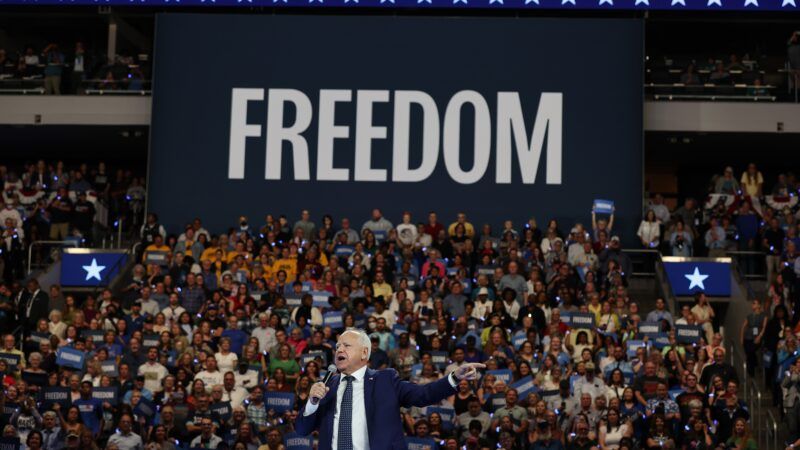Democrats Are Talking About 'Freedom' Because Voters Really Like Freedom
And probably because Republicans have foolishly abandoned it as a unifying theme.

It will be no tremendously deep insight to point out that Democrats have made "freedom" a central theme of this week's convention in Chicago.
What's been less carefully examined is the question of why Democrats are so eager to talk about freedom. The answer says more about the American electorate and the current state of the Republican Party than it does about Vice President Kamala Harris, Minnesota Gov. Tim Walz, or any of the other Democratic dignitaries who have graced the stage at this week's Democratic National Convention (DNC).
In part, that's because the Democrats' attempt to present themselves as the "party of freedom" is such incoherent bunk, as Reason's Matt Welch and Liz Wolfe have already detailed (with an assist from New York Times columnist Jane Coaston on this week's edition of Just Asking Questions). Take your pick of examples: COVID-19 lockdowns (including Walz's creepy lockdown hotline) and school closures, banning gas stoves, hiking taxes, price controls, and so on. We don't need to belabor this point; it's pretty obvious.
But political conventions are more about show business than policy seriousness, and Democrats clearly feel as if there is hay to be made by embracing freedom, even if only rhetorically. That's why it's interesting to ask, well, why?
The obvious reason: Voters like freedom!
This is not a subtle or complicated point. Freedom polls really well. Check out the list of items in this Cato Institute poll that score "extremely well" with a majority of Americans: freedom of speech (74 percent), freedom of religion (68 percent), freedom of assembly (67 percent), freedom of the press (62 percent), and so on.
The pro-freedom numbers are even stronger in this Associated Press poll from April.
On the flip side, majorities of Americans are also worried about losing those freedoms. "Across most groups, at least 60% indicate that there will be a net loss of liberties, freedom and rights over the next decade," the APM Research Lab found in a survey a few years ago. In the Cato poll, released in July, 74 percent of the respondents said a similar thing.
Again, this isn't rocket science! Freedom sells, baby. And at a time when support for both major parties is waning (and was never all that high to begin with), it makes perfect sense for one of the two major parties to try to claim the banner of protecting freedom—a thing that lots of people enjoy and are worried about losing.
Is it honest? Heck no! But it's absolutely an opportunity to shift a few of the double-haters to their side of the ledger.
That opportunity exists, in part, because Republicans have abdicated this high ground. For as long as I can remember, Republicans have been better at talking about freedom. A lot of that was empty rhetoric too, but some of it was translated into policy. The right to bear arms. School choice. Freedom of religion. All that good stuff.
If you'd told me there would be a political convention where one of the nights was themed around "a fight for our freedoms" and featured nearly 100 mentions of the word freedom, I'd have bet a sizable sum that it was the Republican one.
That wasn't the message on display at the Republican National Convention (RNC) last month. Not even close. When Donald Trump's campaign isn't focused on the former president's personal grievances, it's been soggy with the populist right's promises to use the power of the state to control larger swaths of American life. Cutting off immigration. Raising tariffs. Some leading intellectuals in the New Right are even trying to convince Republicans of the merits of hiking taxes.
It's not that most Republicans don't still believe in gun rights and school choice, but rhetorically the focus is obviously on other things. In short, you might say that the GOP has traded its focus on "freedom" for a primary message that's built on "security"—indeed, one of the four nights at the RNC was themed around making America "safe" again. "Freedom" was not explicitly on the menu.
There are still some conservatives who want to maintain the movement's longtime connection to freedom, of course. But they are well outside of the movement's power structure at the moment, in no small part because they've been skeptical of Trump's ascendency and the will-to-power politics it has ushered in on the political right.
And if Republicans are going to abandon freedom as a concept, why wouldn't Democrats try to grab it?
Here's the thing about those majorities of Americans who value freedom: A lot of them would disagree about many other things. Most of them wouldn't identify as libertarians, for that matter. One of the cool things about America is that those labels don't matter, as long as big majorities believe that it's important to protect the freedom to speak, act, worship, and so on.
It would be great to have a major political party sincerely interested in maximizing freedom. We don't, but there's some consolation in realizing that Democrats are so eager to talk about freedom because it remains more popular than any political party.


Show Comments (104)